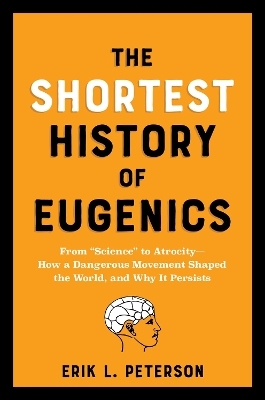
The Shortest History of Eugenics
From "Science" to Atrocity - How a Dangerous Movement Shaped the World, and Why It Persists
Seiten
2024
The Experiment LLC (Verlag)
978-1-891011-88-7 (ISBN)
The Experiment LLC (Verlag)
978-1-891011-88-7 (ISBN)
- Lieferbar (Termin unbekannt)
- Portofrei ab CHF 40
- Auch auf Rechnung
- Artikel merken
A harrowing history of a grim chapter in politics and science, in which groups of influential thinkers shaped global policy with the aim of determining who had the right to have children - and who was worthy of life. The Shortest History books deliver thousands of years of history in one riveting, fast-paced read.
For the last two centuries, groups of influential men have, in the professed interest of fiscal responsibility, crime reduction, and outright racism, attempted to control who was allowed to bear children. Their efforts, “eugenics,” characterise a movement that over the last century swept across the world - from the US to Brazil, Japan, India, Australia, and beyond - in the form of marriage restrictions, asylum detention, and sterilisation campaigns affected millions. German physicians and scientists adopted and then heightened these eugenics practices beginning in 1939, starving or executing those they deemed “life unworthy of life.”
But well after the liberation of Nazi deathcamps, health care workers and even the US government pursued policies worldwide with the express purpose of limiting the reproduction of poor non-whites. The Shortest History of Eugenics takes us back to the founding principles of the movement, revealing how an idea that began in cattle breeding took such an insidious turn - and how it lingers in rhetoric and policy today.
For the last two centuries, groups of influential men have, in the professed interest of fiscal responsibility, crime reduction, and outright racism, attempted to control who was allowed to bear children. Their efforts, “eugenics,” characterise a movement that over the last century swept across the world - from the US to Brazil, Japan, India, Australia, and beyond - in the form of marriage restrictions, asylum detention, and sterilisation campaigns affected millions. German physicians and scientists adopted and then heightened these eugenics practices beginning in 1939, starving or executing those they deemed “life unworthy of life.”
But well after the liberation of Nazi deathcamps, health care workers and even the US government pursued policies worldwide with the express purpose of limiting the reproduction of poor non-whites. The Shortest History of Eugenics takes us back to the founding principles of the movement, revealing how an idea that began in cattle breeding took such an insidious turn - and how it lingers in rhetoric and policy today.
Erik L. Peterson, PhD, is Associate Provost and Associate Professor of the History of Science & Medicine at The University of Alabama. He publishes and teaches about the historical relationship between race and science in the United States and abroad.
| Erscheinungsdatum | 21.11.2024 |
|---|---|
| Verlagsort | New York |
| Sprache | englisch |
| Maße | 128 x 198 mm |
| Gewicht | 300 g |
| Themenwelt | Geschichte ► Teilgebiete der Geschichte ► Kulturgeschichte |
| Studium ► Querschnittsbereiche ► Geschichte / Ethik der Medizin | |
| Sozialwissenschaften ► Ethnologie | |
| Sozialwissenschaften ► Politik / Verwaltung | |
| Sozialwissenschaften ► Soziologie | |
| ISBN-10 | 1-891011-88-X / 189101188X |
| ISBN-13 | 978-1-891011-88-7 / 9781891011887 |
| Zustand | Neuware |
| Haben Sie eine Frage zum Produkt? |
Mehr entdecken
aus dem Bereich
aus dem Bereich
der stille Abschied vom bäuerlichen Leben in Deutschland
Buch | Hardcover (2023)
C.H.Beck (Verlag)
CHF 32,15
vom Mittelalter bis zur Gegenwart
Buch | Softcover (2024)
C.H.Beck (Verlag)
CHF 16,80
Die Revolution des Gemeinen Mannes
Buch | Softcover (2024)
C.H.Beck (Verlag)
CHF 16,80


